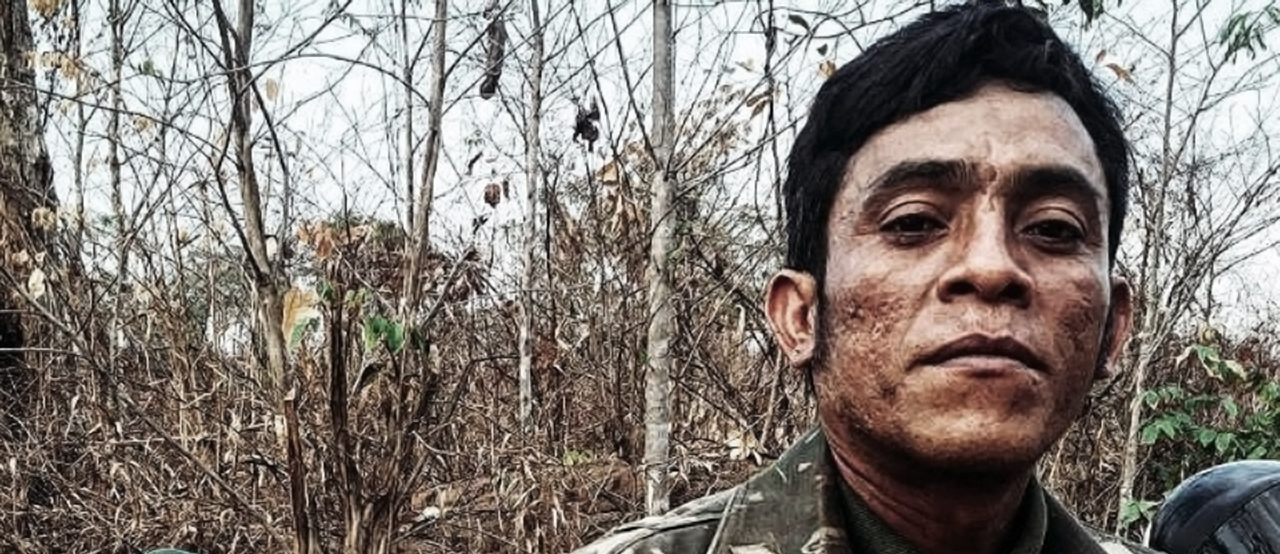By Nathália Urban
On November 1st, Paulo Paulino Guajajara was violently murdered by loggers. Paulino, was a member of the Guardians of the Forest group. The group patrols and protects the Araribóia indigenous land in Maranhão. This was not the first time the group has suffered from loggers’ retaliation for their territorial protection work. Paulino was one of 120 guardians patrolling around their land in search of invaders, trying to keep the only forest left in this area of Maranhão. A role that supposedly is from the state and had to assumed by the indigenous themselves. The reaction of loggers has been violent. According to Amazon Watch lawyer João Coimbra Souza, the Guardians of the Forest group has been patrolling the indigenous reserve for almost 2 decades, and that the reports of violence against the group are not a novelty.
“There has been more murders and attacks, the situation there is tense. Especially because the indigenous reserve represents the only concentration of forest in the region”
According to Coimbra Sousa, Paulino was rated to be the new Guajajara Cacique (the leader), which may have been one of the reasons for his death, specially since the death of former Cacique Jorginho Guajajara, who was found dead in a river, and his death was treated as suspicious by his community.
All this outbreak of violence against indigenous people makes me wonder why the situation has to go to extremes for the society and especially the mainstream media to pay attention to the clear hostility they have been suffering.According to the mapping done by the Indigenous Missionary Council (CIMI), the number of indigenous murders in Brazil increased from 110 in 2017 to 135 in 2018, an increase of 22.7%. The states with the most cases recorded last year were Roraima, where there were 62 homicides, and Mato Grosso do Sul, where there were 38 deaths. The rate of attacks on indigenous territories has already exceeded that of 2018, this year alone they have suffered more than 160 attacks.
Bolsonaro’s position on indigenous and traditional populations is the worst possible. It is important to remember bolsonaro’s speech during his campaign where he infamously said: “You can be sure that if I get there, there will be no money for NGOs. It will not have an inch demarcated for indigenous reserve or quilombola. Where there is an indigenous land, there is a wealth beneath it. We have to change that ”and have compared a Quilombola community member to an animal whose body mass is measured by arrobas. Bolsonaro’s discourse on traditional populations seems to be a distorted version or even a flirtation with the ideas of racial supremacists from the global north.
The complicated aspect is that the already delicate and historically complex situation has gotten even worse, “Bolsonaro’s election certainly fomented feelings of hostility and violence against traditional communities, especially indigenous ones, making the work of the guardians more dangerous. ”said Coimbra Sousa, “When a minority movement activist dies, this is not just a personal loss to the cause but a cruel attempt to silence all the people that that person represents, we don’t need martyrs, we need live people making a difference.”.
An APIB delegation is traveling Europe at the moment, and one of the demands is that the European Parliament interrupt the process of ratifying the trade agreement between Mercosur and Europe until the government of Jair Bolsonaro shows commitment to protecting traditional populations and the environment.
All this violence and attempted silencing of the original peoples has more than the racial component, Bolsonaro seems to be bothered by any group that refuses to have a non-market view of land use. Brazil’s Environment Minister Ricardo Salles said that the solution to illegal logging in the Amazon is to monetize it by opening up areas for commercial development, this can be interpreted as a declaration of war against the communities who have the ethos of living an almost symbiotic relationship with the environment.
This posture of little interest in environmental preservation is nothing more than an attempt (very amateurish one, by the way) to please foreign capital, and to affirm Brazil’s position as a subservient country to the United States and Europe. This can be seen more clearly in the report compiled by AmazonWatch Complicity in Destruction, where the organization details how companies are profiting from environmental destruction and by all means decimating traditional populations in Brazil.
Unfortunately this hostility against indigenous people is crossing borders, the coup against Evo Morales and his party MAS had strong racist components. Morales was the first indigenous president of Latin America. The political coup reverberated even among the Brazilian indigenous. Sonia Guajajara, indigenous leader who ran for vice presidency for PSOL , received the news with sadness, on her Twitter Sonia said:
“The only indigenous presidency in the history of Latin America and the Caribbean has ended with a consummate coup d’etat. It’s not just Evo, it’s a popular indigenous project that is being overturned. We have to denounce, we have to resist.”
The dystopian reality has reached such unimaginable levels that the motto of the APIB delegation is Indigenous Blood: Not a single drop, a direct reference to all the violence they have suffered and still suffer on daily basis.
The death of Paulo Paulino Guajajara leaves the fight for the environment and the indigenous cause poorer that is a fact, but it also leaves his pregnant wife and 2-year-old son without a father, and the Guajajara people without a powerful leader.
[qpp]

